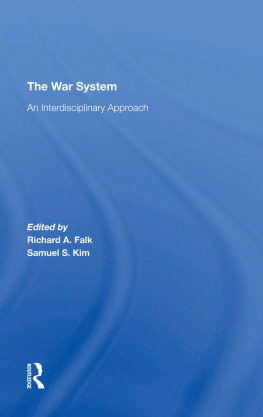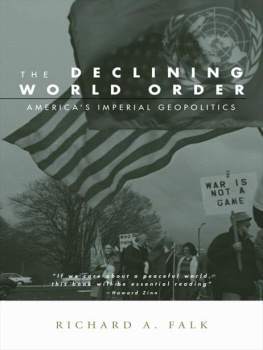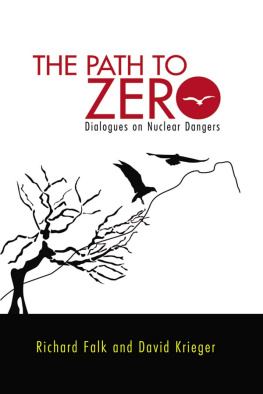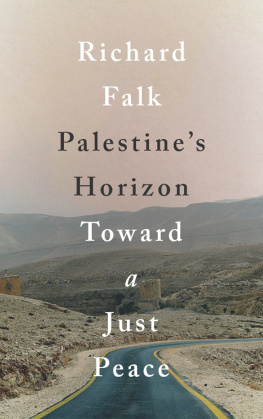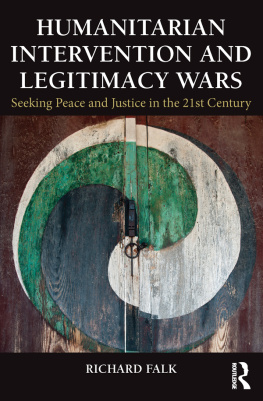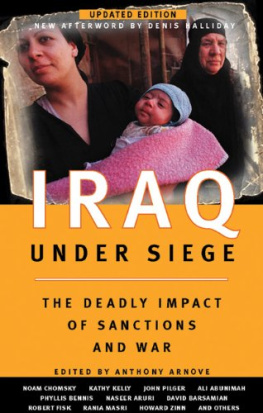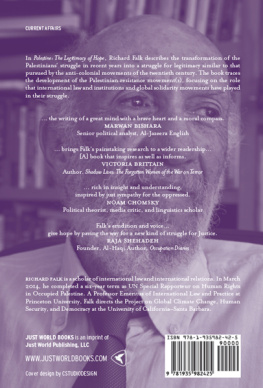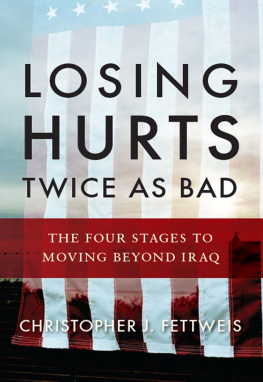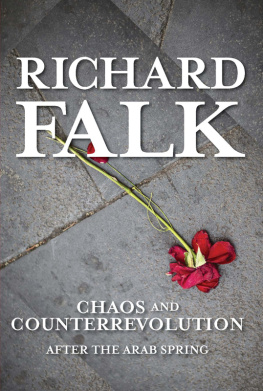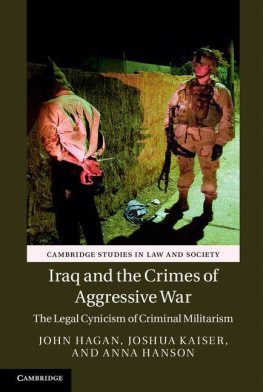Routledge
Taylor & Francis Group
270 Madison Avenue
New York, NY 10016
Routledge
Taylor & Francis Group
2 Park Square
Milton Park, Abingdon
Oxon OX14 4RN
2008 by Taylor & Francis Group, LLC
Routledge is an imprint of Taylor & Francis Group, an Informa business
Transferred to Digital Printing 2008
International Standard Book Number-13: 978-0-415-95509-6 (Softcover) 978-0-415-95508-9 (Hardcover)
No part of this book may be reprinted, reproduced, transmitted, or utilized in any form by any electronic, mechanical, or other means, now known or hereafter invented, including photocopying, microfilming, and recording, or in any information storage or retrieval system, without written permission from the publishers.
Trademark Notice: Product or corporate names may be trademarks or registered trademarks, and are used only for identification and explanation without intent to infringe.
Library of Congress Cataloging-in-Publication Data
Falk, Richard.
The costs of war : international law, the UN, and world order after Iraq / Richard Falk. -- 1st ed.
p. cm.
ISBN 978-0-415-95508-9 (hardback : alk. paper) -- ISBN 978-0-415-95509-6 (pbk. : alk. paper) -- ISBN 978-0-203-94070-9 (ebook)
1. Iraq War, 2003---Law and legislation. 2. International law. I. Title.
KZ6795.I73.F35 2008
Visit the Taylor & Francis Web site at
http://www.taylorandfrancis.com
and the Routledge Web site at
http://www.routledge.com
For Hilal
Life partner in love and all else that matters
Acknowledgments
Most of my professional life has involved a struggle with political realists who viewed the world through a prism of power, with morality and legality assigned to the outer margins of policy and decision. It has also led to tensions with many in the international law community who shared this realist vision, although often calling themselves liberals due to their abstract enthusiasm for international law and the United Nations. Concretely, for such liberals this meant accepting a subordinate role for law and the authority of the UN Charter when it came to matters of war and peace engaging the United States. The debates surrounding the lawfulness of the Vietnam War was the most illuminating test of this fundamental normative tension, and was the maturing moment for my own approach to world order.
With the rise of the neoconservatives to governmental ascendancy in this country, especially in the period following the 9/11 attacks, the locus of debate and concern has moved so far to the right as to make me feel unexpectedly nos-talgic about the good old days when the primacy of realism shaped American foreign policy. At least realists acknowledged the limits of power, and prided themselves on the geopolitical virtue of prudence, regarding their main undertaking the maintenance of countervailing military capabilities with the goal of avoiding war. In contrast, neoconservatives conceived of their mission as the global spread of American values, expressed to be sure in self-serving terms relating to the interests of big business, military dominance, and energy geopolitics, with centrality accorded to unilateral war making conceived as a necessary and appropriate enterprise. International law was treated as irrelevant, indeed law in general was so treated, with limitless and supposedly unaccountable power to play the security card allegedly vested in a post-9/11 wartime presidency of imperial pretensions. While law was made irrelevant, lawyers were not. Lawyers of neoconservative persuasion twisted and turned respected constraints of law to such an extent as to shock even the hardened sensibilities of realists, and to make liberals previously compliant with the ways of the power into radical critics of government policy.
It is against such a background that this book looks at international law and UN authority in the twenty-first century within the context of the American debate on security policy after 9/11. In fundamental respects, my central argument is that historical circumstances, correctly interpreted, are such as to reverse relations between power and law, making adherence to international law the most reliable discipline for the exercise of power even if the dominant criterion for policymakers is the pursuit of national interests. Such a view is especially persuasive in the current global setting where American power is unchecked by countervailing power, but is still subject to the sorts of resistance that makes its use productive of national ordeals (such as Iraq) rather than occasions of political and military victory. In short, geopolitical wisdom in this new century counsels a law-oriented foreign policy for the United States. This is the main message of this book.
The writings in this volume are anchored in responses to the somewhat contradictory challenges posed by the Kosovo War in 1999 and the Iraq War that started in 2003. Most of the chapters draw on previously published material written during the first years of this new century. There is some overlap because of the attention given to these two wars from a variety of perspectives. No undertaking of this sort would be possible without the support, insight, and inspiration of colleagues throughout the world. I want to acknowledge and thank only those few who were particularly influential in this recent period: Georges Abi-Saab, Asli Bali, Upendra Baxi, Amy Bartholomew, Alison Brysk, Hilary Charlesworth, Fred Dallmayr, Ahmet Davutoglu, Michael Doyle, Howard Friel, David Ray Griffin, Irene Gendzier, Stephen Gill, Mary Kaldor, David Krieger, Lisa Hajjar, Robert Jay Lifton, Saul Mendlovitz, Chandra Muzaffar, Balakrishnan Rajagopal, Amin Saikal, Andrew Strauss, Rob Walker, Paul Wapner, and Burns Weston.
This book was written entirely during my period of affiliation with the Program of Global and International Studies of the University of California at Santa Barbara. In this regard I wish to thank Richard Appelbaum, Giles Gunn, and Mark Juergensmeyer for their interest, support, and most of all, for their friendship. Many others at UCSB have made this an enjoyable, congenial, and stimulating atmosphere, especially Avery Gordon, Chris Newfield, Jacqueline Stevens, Elisabeth Weber, and Howard Winant. My close relationship with David Krieger, and the Nuclear Age Peace Foundation, has also strengthened my appreciation of the importance of getting governments, particularly our own, to respect law and morality for the sake of human survival and the well being of the earth community.
Finally, my wife, Hilal, to whom this book is happily dedicated, has shared all of these concerns with grace and humor, while making me feel more than ever that life is a sacred gift and that the future needs to be preserved for the sake of our precious children and grandchildren, and for the benefit of the born and unborn peoples of the world. It will take more than law and morality, but it cannot be done without a dramatic deepening of this collective normative consciousness of humanity.


